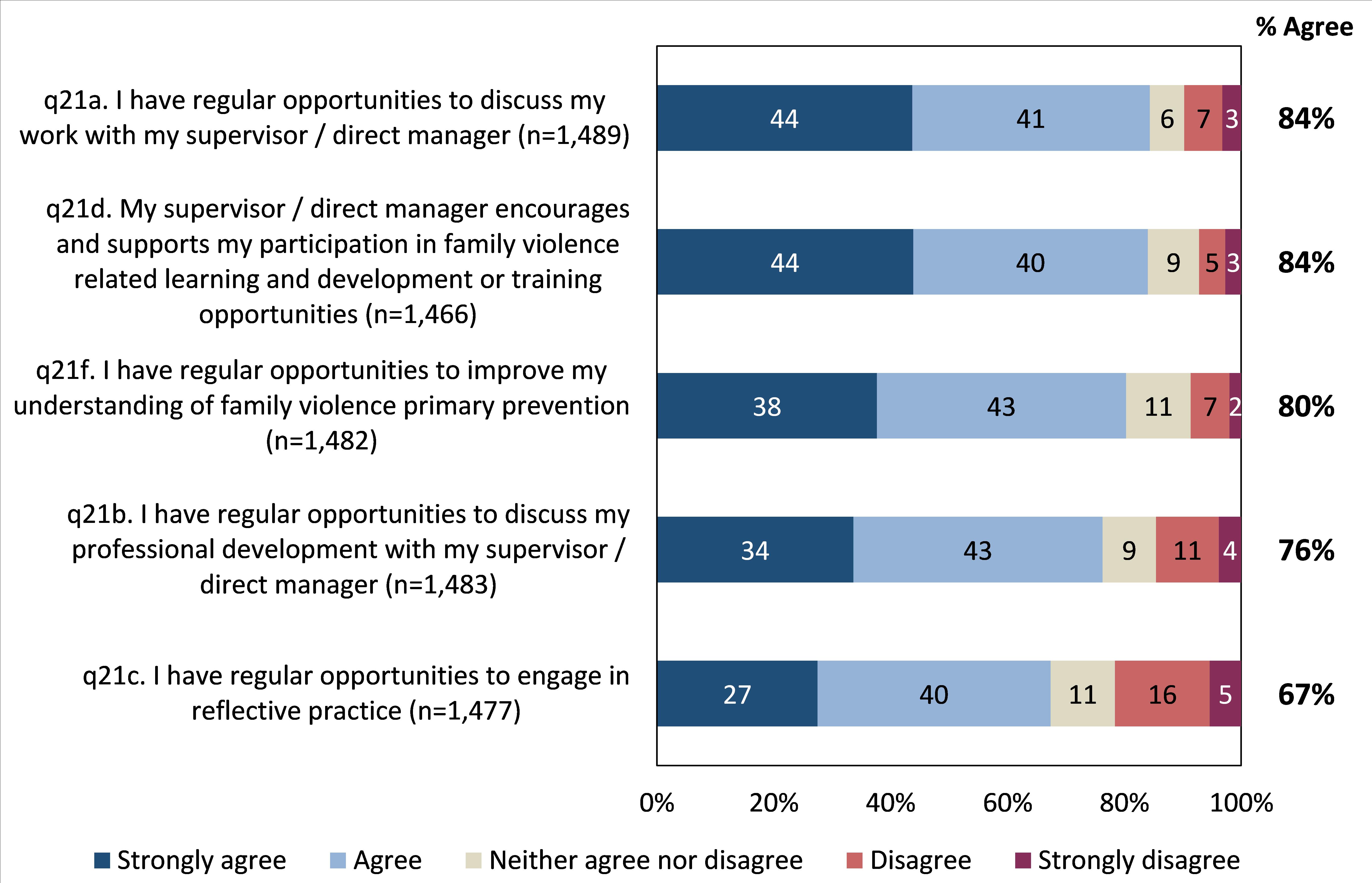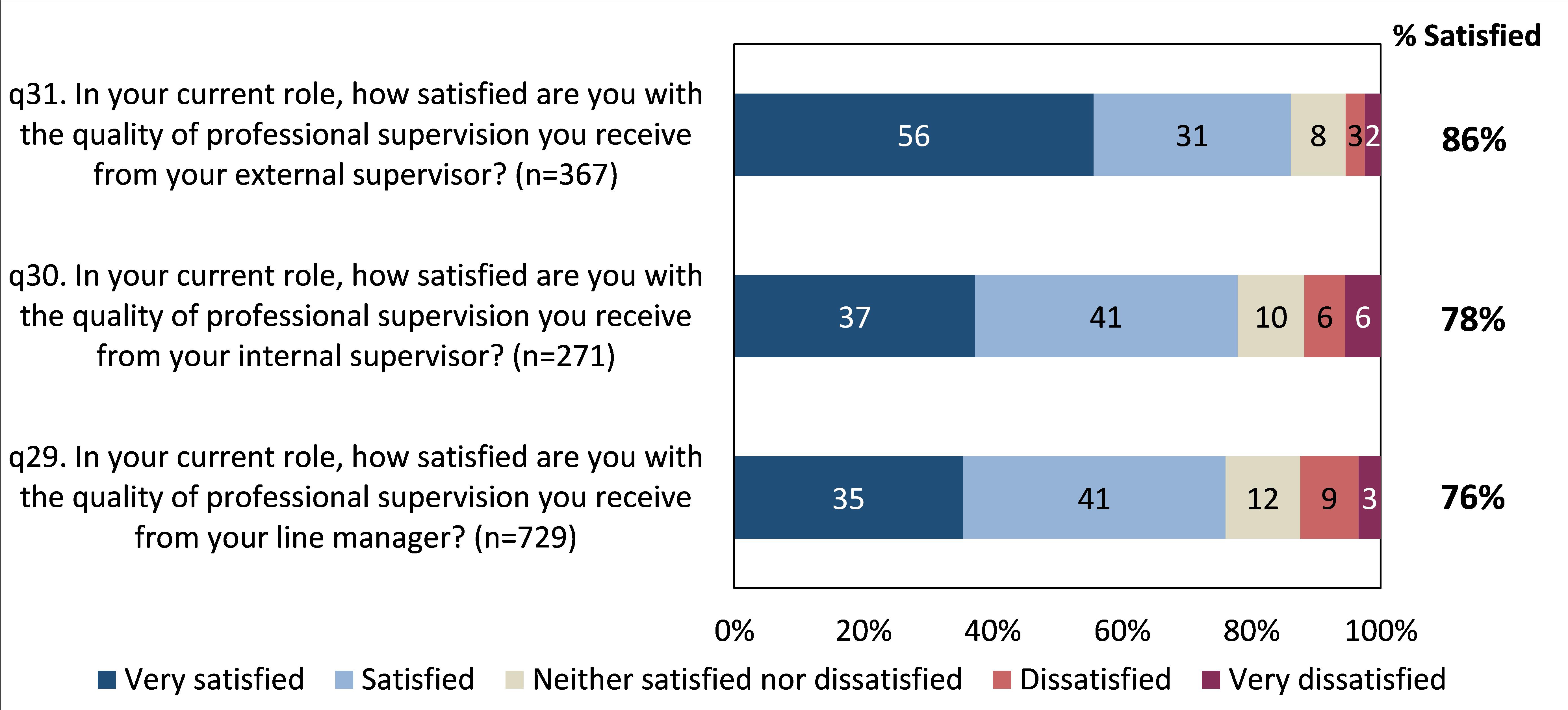Overall, the results indicated that workers in the specialist family violence response workforce were satisfied with the quality of support provided to them by their supervisor or direct manager, and that having the opportunity to regularly discuss both their work and their professional development were key drivers of this satisfaction.
Additionally, this workforce was also broadly satisfied with the quality of professional supervision that they received, particularly with external supervisors (from outside of their organisation).
As illustrated in Figure 6, three-quarters of the specialist family violence response workforce reported that they were satisfied with the quality of supervision provided by their supervisor or manager (75%). Few were dissatisfied (14%).
Additionally, many respondents agreed that:
- they have regular opportunities to discuss their work with their supervisor / direct manager (84%, see Figure 7); and
- their supervisor / direct manager encourages and supports their participation in family violence related learning and development or training opportunities (84%).
Though still fairly high, specialists were less likely to feel that they had regular opportunities to engage in reflective practice1, with 67% agreeing that this was the case.
To determine what was most important in influencing the overall levels of satisfaction with support provided by supervisors/managers amongst this workforce, regression analysis was undertaken. The results suggest that the most influential drivers of satisfaction were having regular opportunities to discuss both their work generally, and their professional development.
Professional supervision
Key results by organisation type are shown in Table 3 below.
| Organisation type | Overall support provided by supervisor / direct manager (Q22) | Professional supervision provided by line manager (Q29) | Professional supervision provided by internal supervisor (Q30) | Professional supervision provided by external supervisor (Q31) |
|---|---|---|---|---|
|
Overall workforce (n=271-1,500)* |
75% |
76% |
78% |
86% |
|
Specialist family violence victim survivor services (n=94-576) |
75% |
77% |
82% |
86% |
| Specialist family violence perpetrator services / Men's behaviour change (n=48-195) |
73% |
76% |
75% |
83% |
| Aboriginal Community Controlled Organisation (n=6-38) |
63% |
67% |
Supressed (low sample size) |
Supressed (low sample size) |
| Alcohol or other drug services (n=9-41) |
83% |
75% |
Supressed (low sample size) |
86% |
| Victims assistance (n=7-37) |
73% |
56% |
Supressed (low sample size) |
60% |
| Peak body (n=3-45) |
76% |
88% |
Supressed (low sample size) |
88% |
| Women’s health (n=4-37) |
70% |
75% |
Supressed (low sample size) |
88% |
| Child protection (n=4-14) |
86% |
Supressed (low sample size) |
Supressed (low sample size) |
Supressed (low sample size) |
| Community health (n=17-110) |
70% |
67% |
94% |
93% |
| Courts and court services (n=17-84) |
69% |
79% |
71% |
71% |
| Family safety contact (n=6-37) |
70% |
82% |
Supressed (low sample size) |
Supressed (low sample size) |
|
Hospital (n=9-71) |
77% |
64% |
93% |
Supressed (low sample size) |
| Housing / Social housing / Homelessness (n=6-54) |
78% |
84% |
Supressed (low sample size) |
Supressed (low sample size) |
| Legal services (n=18-116) |
74% |
68% |
61% |
79% |
| LGBTIQ services (n=4-25) |
68% |
82% |
Supressed (low sample size) |
90% |
| Mental health services (n=11-44) |
70% |
62% |
100% |
92% |
| Multicultural or settlement services (n=1-16) |
63% |
Supressed (low sample size) |
Supressed (low sample size) |
Supressed (low sample size) |
|
Older people (including elder abuse) services (n=1-15) |
87% |
Supressed (low sample size) |
Supressed (low sample size) |
Supressed (low sample size) |
|
Education and training provider (family violence) (n=6-37) |
76% |
73% |
Supressed (low sample size) |
91% |
| Sexual assault services (n=20-72) |
81% |
78%
|
80% |
90% |
| Regional integration (n=0-14) | 93% | Supressed (low sample size) | Supressed (low sample size) | Supressed (low sample size) |
Footnotes
- Reflective practice, also referred to as critical reflection or reflexivity, is a process of self-examination by a practitioner about their own work; becoming self-aware, considering their thoughts, feelings and assumptions, and examining how these impact upon their work.
- Q23. In your current role, do you provide or receive professional supervision? Multiple responses accepted (n=1,475)
Updated


